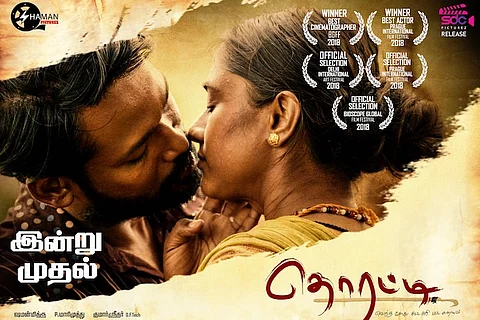

Thorati, a film set in the 80s, is a reminder that all actions have consequences. In that sense, the film has simple characters - the good guys and the bad ones. Directed by P Marimuthu, the film stars Shaman Mithru (also producer) and Sathyakala in lead roles. We’re also told that the film has been inspired by real life events.
Thorati, a tool used by goat herders, is a sickle attached to one end of a long stick. The film’s protagonists are goat herders who travel from one village to the next. They sustain by growing feed for their cattle on farmlands that have been harvested and in turn enrich the soil with manure. This mutually beneficial relationship helps them get by. Thorati follows two such families who are on the move - Mayan’s (Shaman Mithru) and Semponnu’s (Sathyakala).
All through the film, this instrument (thorati) is a recurring and an important element. In one scene, Mayan sleeps even while standing with the help of his thorati. This is a technique passed on from father to son, we’re told. In another, the thorati represents the groom and a wedding is held, a practise that, we’re told, was followed by their forefathers. In another significant scene, Mayan breaks his thorati in half, a damage that is later fixed but not without leaving a mark.
It is possible to label the film under ‘love story’ but Thorati is more than that. It has bits and pieces of real people written into it. The film is also filled with superstitions and also captures the life of a community, with their unique traditions and rituals and makes for an interesting watch. In one shot, Semponnu pours goat milk into a tamarind pod and relishes it like one would an ice-cream stick.
Mayan’s father, cheated by a landowner, digs a hole in his land, buries a pot with goat’s milk and curses for the land to remain barren until his dues are paid. While we’re not shown what happens to the landowner, the curse comes back to haunt Mayan’s father soon enough. A reminder that actions have consequences.
In another, Semponnu pours goat’s milk over Mayan’s father’s hand and promises to marry his son, who at that point turns into a wastrel.
There’s also a pronounced difference between Mayan and Semponnu’s characteristics. While Semponnu is outspoken and more worldly, Mayan is naive, simple-minded and impressionable. He doesn’t just befriend the thieves who sneak out with one of his goats, he goes as far as cooking the meat for them. Even while everyone around Mayan warns him of his new companions, he is shown to be the kid who has strayed far beyond.
While Mayan is a version of Sappani, Semponnu can be compared to Mayil (both characters from 16 Vayathinele played by Kamal and Sridevi). She shed no tears when Mayan comes hiccupping-drunk for their engagement. Instead she’s unfazed. She even slaps him on the face to bring him back to his senses. While she openly refuses to consummate their marriage at first, she does not hesitate to ask for sex when she wants it. Semponnu is a delightful mix of charming and headstrong and Sathyakala does a great job in portraying her on screen. In fact, in her introductory scene, Semponnu is shown standing on a high branch on a jamun tree, blaming the fruit for being irresistible.
Thorati’s story is more of Mayan breaking out of his cocoon, of him understanding the different shades to people. Shaman Mithru has perfected the simple-minded Mayan’s body language quite well in this film. The fight sequence in the climax does not go over board by suddenly showing Mayan breaking limbs. Instead it has him shuffle awkwardly with the thorati’s sickle in hand.
The film, however, poorly establishes the time period. Except for Mayan’s retro shirts, the film feels like it could have been from any other period. The film gets predictable mid-way and feels like a drag towards the end. Thorati with its black and white story, has captured the lives of goat herding families in the 80s in Tamil Nadu fairly well. It does not discuss caste politics and remains a straightforward story. Thorati, however, makes you feel lees invested in its characters by wandering off route like one of its goats.
Disclaimer: This review was not paid for or commissioned by anyone associated with the series/film. TNM Editorial is independent of any business relationship the organisation may have with producers or any other members of its cast or crew.